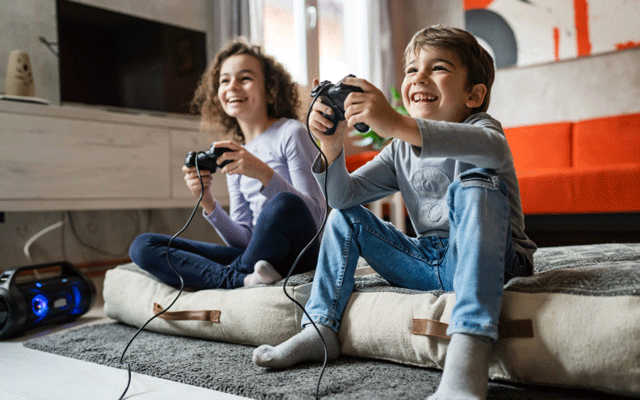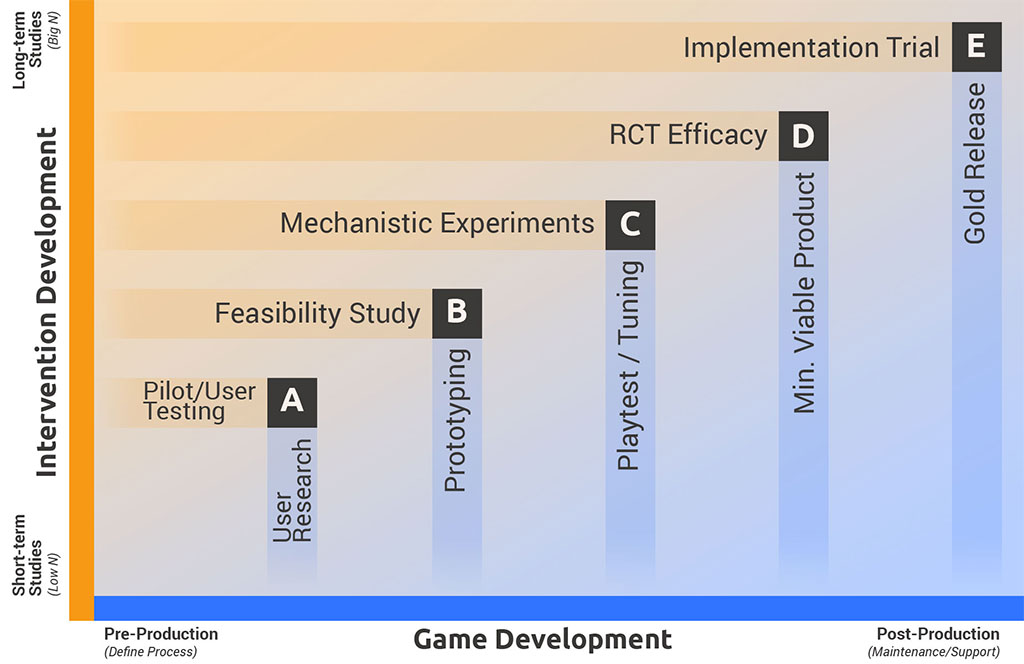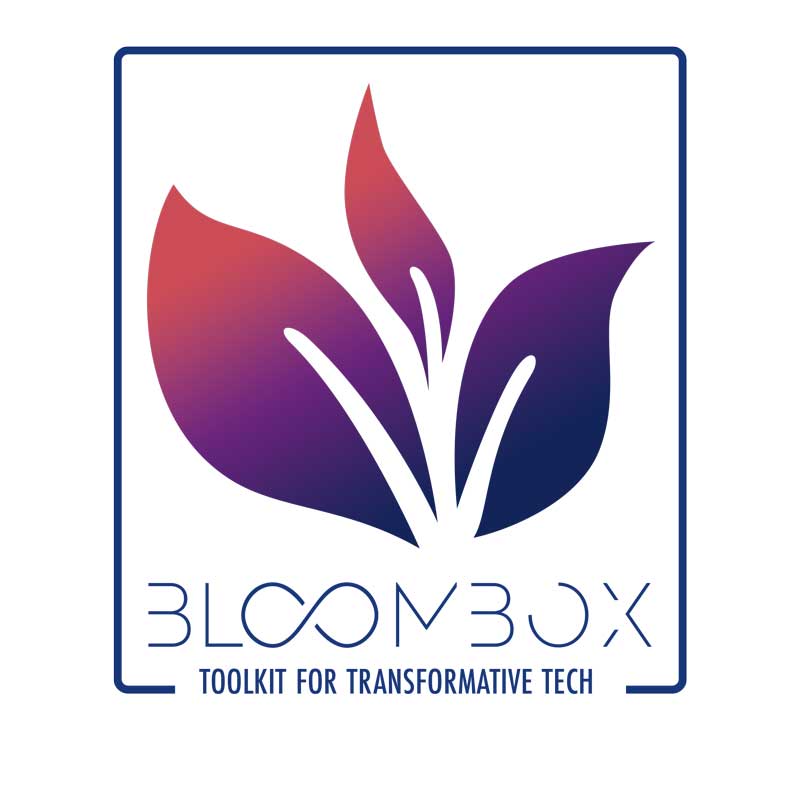Publications |
|
|
We have produced 100+ scientific publications and thanks to our funders, we are open-access. We are able to regularly share insights across all fields of interest, ensuring that everybody can access the publications freely.
|

Back to Our Foundation: Why Games?
It all started for us by observing that many children and teens either don’t find their way to treatment or that treatment turns out to be insufficiently effective and sustainable for them. This is the result of limitations in the delivery of these clinical evidence-based principles – not the principles themselves. Conventional therapy does not always meet the needs of young people, can feel stigmatizing or become tedious.
In contrast, games and other playful digital technologies are an excellent delivery model because they are engaging, intrinsically motivating, accessible, personable, much less stigmatizing, and they provide ample organic space for practice.

Core Scientific Principles
Researching playful technologies requires a structured approach to bolster both Science ⥂ Design
A Solid Evidence-Based Foundation
We balance science with design, making sure that all of the playful digital technologies we create are based on solid scientific theory and evidence-based mechanisms. We systematically work out what our desired short-term and long-term outcomes are and which psychological mechanisms and evidence-based techniques could lead to those outcomes. Finally, we translate those evidence-based techniques into playful and engaging mechanics.
Appropriate Study Scales
The choice for the design of our studies is dependent on the project’s phase. In the beginning, we make sure we remain flexible by using quick pilot study designs, followed over time by larger feasibility and efficacy studies and—ultimately—implementation trials.
(see image on the left)
Mixed Methods
When designing playful digital technologies, we have questions around whether we are reaching the outcomes we were targeting but also questions related to engagement and usability. We value the insights that a combination of more quantitative and more qualitative methods can give us to answer these questions in as much detail.

Bloombox
For more examples of our workflow, designs, or if you are just looking for a place to start...
☞ check the Bloombox Toolkit ☜
With these tools we have empowered many of our collaborators to realize their vision, and we would love to know if it can help you too.
Significant Publications
Below we have selected our ten key scientific publications, ranging from elaborations on our games and scientific method, to theoretical and conceptual articles.
-
2021
A Randomized Controlled Trial Assessing the Efficacy of a Virtual Reality Biofeedback Video Game: Anxiety Outcomes and Appraisal Processes
Weerdmeester, J., van Rooij, M. M.J.W., Maciejewski, D. F., Engels, R. C.M.E, & Granic, I. (2021). A Randomized Controlled Trial Assessing the Efficacy of a Virtual Reality Biofeedback Video Game: Anxiety Outcomes and Appraisal Processes. Technology, Mind, and Behavior. doi: 10.1037/tmb0000028
-
2021
Beyond Screen Time: Identity Development in the Digital Age
Granic, I., Morita, H., & Scholten, H. (2020). Psychological Inquiry, 31(3), 195-223. https://doi.org/10.1080/1047840X.2020.1820214
-
2022
Deep-Breathing Biofeedback Trainability in a Virtual-Reality Action Game: A Single-Case Design Study With Police Trainers
Michela, A., van Peer, J. M., Brammer, J. C., Nies, A., van Rooij, M. M. J. W., Oostenveld, R., Dorrestijn, W., Smit, A. S., Roelofs, K., Klumpers, F., & Granic, I. (2022). Frontiers in Psychology, 13, 29. https://doi.org/10.3389/fpsyg.2022.806163
-
2014
The Benefits of Playing Video Games
Granic, I., Lobel, A., & Engels, R. C. (2014). American Psychologist, 69, 66-78.
-
2020
A Randomized Controlled Trial to Test the Effectiveness of a Peer-Based Social Mobile Game Intervention to Reduce Smoking in Youth
Scholten, H., Luijten, M., & Granic, I. (2019). Development and Psychopathology, 31, 1923-1943. doi: 10.1017/S0954579419001378
-
2017
Preventing Childhood Anxiety Disorders: Is an Applied Game as Effective as a Cognitive Behavioral Therapy-Based Program?
Schoneveld, E. A., Lichtwarck-Aschoff, A., & Granic, I. (2017). Prevention Science, 1-13.
-
2020
Efficacy of a Virtual Reality Biofeedback Game (DEEP) to Reduce Anxiety and Disruptive Classroom Behavior: Single-Case Study
Bossenbroek, R., Wols, A., Weerdmeester, J., Lichtwarck-Aschoff, A., Granic, I., & van Rooij, M. (2020). JMIR Mental Health, 7(3), e16066. http://dx.doi.org/10.2196/16066
-
2020
A Stimulated Recall Method for the Improved Assessment of Quantity and Quality of Social Media Use
Griffioen, N., Van Rooij, M., Lichtwarck-Aschoff, A., & Granic, I. (2020). J Med Internet Res 2020;22(1):e15529.
-

2020
Use of the Principles of Design Thinking to Address Limitations of Digital Mental Health Interventions for Youth: Viewpoint
Scholten, H., & Granic, I. (2019). Journal of Medial Internet Research, 21(1), e11528. doi: 10.2196/11528
-
2018
In-Game Play Behaviours during an Applied Video Game for Anxiety Prevention Predict Successful Intervention Outcomes
Wols, A., Lichtwarck-Aschoff, A., Schoneveld, E. A., & Granic, I. (2018). Journal of Psychopathology and Behavioral Assessment, 40, 655-668. https://doi.org/10.1007/s10862-018-9684-4
Latest Projects View all projects
-
Project Lead Category Project StatusBloombox Group Transformative Tech Preparation
Bloombox: A Toolkit for Creating Transformative Tech
About the projectCreating digital tech—whether it be videogames or apps—that makes a real impact on human flourishing is hard! Luckily, at the GEMH Lab we have amassed many lessons learned, tips, tricks and caveats over the years of our existence. All of which we aim to bring together in the Bloombox: a toolkit for creating transformative tech.
-
Project Lead Category Project StatusBloombox Group Transformative Tech Preparation
Play-Based Grieving in Minecraft
About the projectChildren who experience the death of a parent or sibling can feel isolated and alone in their grief and often lack access to safe, supportive, and developmentally appropriate online settings where they can connect with other peers and caring adults who “get” their grief. ExperienceCraft is a youth-led, online community for grieving children, where they can play, connect, and learn with others who have experienced the death of a caregiver, sibling, or close member of their community.
-
Project Lead Category Project StatusBloombox Group Transformative Tech Preparation
The Social Healing Project
About the projectThe Social Healing Project sets forth a new paradigm for social healing—one rooted in evidence-based indicators; imagined through holistic, interdisciplinary experience; refined by collaborative building; and made to be used, engaged with, and benefitted from by the public.
Youth that play video games regularly
Youth who need mental health care but receive no services
Children diagnosed with an anxiety disorder


